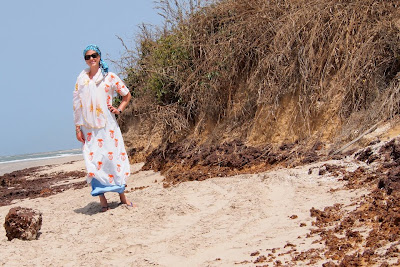Casamance: Be careful, the rebels are over there…
When you utter the name of Casamance, you are likely to hear the same warning, “Be careful, the are rebels over there!” In spite of the many news stories alerting potential voyagers of the imminent danger due to rebellion skirmishes, the hardy and the adventurous continue to venture forth in order to see the incredible beauty of Casamance. Tree-lined streets, abundantly verdant mangrove reserves and outstanding beaches categorize this unique region of Senegal that has seen its share of turbulence and remains economically depressed by the rare outcropping of violence.
As I have stated in previous blogs, I have been blessed with a cornucopia of contacts here in Senegal, covering practically every region. The grandmother of one of my friends in Dakar lives in Ziguinchor with her daughter-in-law and a couple other family relations. When his grandmother received the news that she was going to host one of her grandson’s friends from the U.S. she was delighted. My friend’s aunt picked me up from the garage and took me back to their home, paying for the taxi ride and treating me like a beloved friend. Lunch was waiting for me, and I knew my four days with his family would pass with a lot of joy.
Surely I am glad that I can now communicate in Wolof on a basic level because his family did not speak any French. I showed my appreciation by participating in the housework, sweeping my room, doing dishes, helping with the cooking, folding laundry and playing with the four kids who lived at the house. One of the best ways for a female guest to integrate into a Senegalese household is to show interest in the daily chores. I have remarked upon how quickly people become accustomed to my presence based on my willingness to imitate. I went visiting to meet several other family members and friends and became familiar with the neighborhood and the local marketplace.
Before leaving Casamance, I knew I needed to visit one of the most celebrated areas of Senegal, which used to be one of the most important tourist destinations before the rebellion and disorder started in the early 90’s. Cap Skirring certainly did not disappoint: with scenic variation incomparable to that of any beach I have ever seen, I was charmed and entranced. Whirling and puffing, the wind disturbed the sand in a poetic manner, causing white wisps to swirl around my ankles as I walked with the purpose of an itinerant tourist. I passed herds of cows tanning on the beach; I had never seen cows sunning themselves on the sand, which caused me great amusement on my promenade and added to the noteworthy qualities of this unrivaled beach paradise. Brief at five hours, my foray into paradise was short-lived but moving and memorable.
Tip #18 for Surviving in Senegal: When buying a ticket for the local transport between cities, ask how many places remain. Do not wait around for a mini-car or a bus to fill up because it might take all day. Vehicles only leave the garage when they are full; I have learned that the 7-passenger hatchbacks are often the best transportation option because they fill up quickly. If you get lucky and show up to find a mini-car almost full, save the extra couple of bucks and hop in.
As I have stated in previous blogs, I have been blessed with a cornucopia of contacts here in Senegal, covering practically every region. The grandmother of one of my friends in Dakar lives in Ziguinchor with her daughter-in-law and a couple other family relations. When his grandmother received the news that she was going to host one of her grandson’s friends from the U.S. she was delighted. My friend’s aunt picked me up from the garage and took me back to their home, paying for the taxi ride and treating me like a beloved friend. Lunch was waiting for me, and I knew my four days with his family would pass with a lot of joy.
Surely I am glad that I can now communicate in Wolof on a basic level because his family did not speak any French. I showed my appreciation by participating in the housework, sweeping my room, doing dishes, helping with the cooking, folding laundry and playing with the four kids who lived at the house. One of the best ways for a female guest to integrate into a Senegalese household is to show interest in the daily chores. I have remarked upon how quickly people become accustomed to my presence based on my willingness to imitate. I went visiting to meet several other family members and friends and became familiar with the neighborhood and the local marketplace.
Before leaving Casamance, I knew I needed to visit one of the most celebrated areas of Senegal, which used to be one of the most important tourist destinations before the rebellion and disorder started in the early 90’s. Cap Skirring certainly did not disappoint: with scenic variation incomparable to that of any beach I have ever seen, I was charmed and entranced. Whirling and puffing, the wind disturbed the sand in a poetic manner, causing white wisps to swirl around my ankles as I walked with the purpose of an itinerant tourist. I passed herds of cows tanning on the beach; I had never seen cows sunning themselves on the sand, which caused me great amusement on my promenade and added to the noteworthy qualities of this unrivaled beach paradise. Brief at five hours, my foray into paradise was short-lived but moving and memorable.
Tip #18 for Surviving in Senegal: When buying a ticket for the local transport between cities, ask how many places remain. Do not wait around for a mini-car or a bus to fill up because it might take all day. Vehicles only leave the garage when they are full; I have learned that the 7-passenger hatchbacks are often the best transportation option because they fill up quickly. If you get lucky and show up to find a mini-car almost full, save the extra couple of bucks and hop in.







Comments